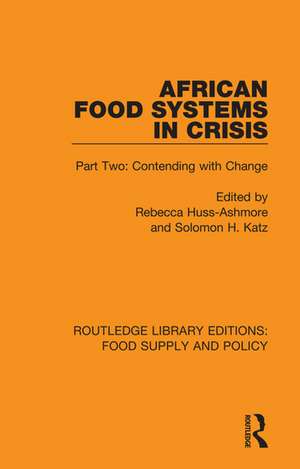African Food Systems in Crisis: Part Two: Contending with Change: Routledge Library Editions: Food Supply and Policy
Editat de Rebecca Huss-Ashmore, Solomon H Katzen Limba Engleză Paperback – feb 2021
The contributors emphasize integrating all development programs with the regional customs and traditions already in place that have thus far allowed its people to cope with food and water shortages. In the past, various strategies have failed due to misunderstandings and incorrect assumptions concerning gender roles, food consumption habits, social relations, kinship networks, land use and government function. New understanding of the culture must be complemented with multifaceted programs incorporating education, a concern for grass-roots opinion and control, attention to production and consumption patterns, and various forms of broad-spectrum integrated development.
The uniqueness research is recommended for all who are concerned about worldwide malnutrition and those who understand the need to recognize local traditions as resources that must be included in any successful development program.
| Toate formatele și edițiile | Preț | Express |
|---|---|---|
| Paperback (2) | 217.57 lei 6-8 săpt. | |
| Taylor & Francis – feb 2021 | 217.57 lei 6-8 săpt. | |
| Taylor & Francis – feb 2021 | 318.95 lei 6-8 săpt. | |
| Hardback (2) | 475.14 lei 6-8 săpt. | |
| Taylor & Francis – 31 iul 2019 | 475.14 lei 6-8 săpt. | |
| Taylor & Francis – 31 iul 2019 | 597.37 lei 6-8 săpt. |
Din seria Routledge Library Editions: Food Supply and Policy
-
 Preț: 314.71 lei
Preț: 314.71 lei -
 Preț: 315.47 lei
Preț: 315.47 lei -
 Preț: 330.10 lei
Preț: 330.10 lei -
 Preț: 317.21 lei
Preț: 317.21 lei -
 Preț: 314.92 lei
Preț: 314.92 lei -
 Preț: 312.20 lei
Preț: 312.20 lei -
 Preț: 288.36 lei
Preț: 288.36 lei -
 Preț: 316.49 lei
Preț: 316.49 lei -
 Preț: 217.57 lei
Preț: 217.57 lei -
 Preț: 448.82 lei
Preț: 448.82 lei -
 Preț: 317.42 lei
Preț: 317.42 lei -
 Preț: 338.15 lei
Preț: 338.15 lei - 36%
 Preț: 4744.59 lei
Preț: 4744.59 lei
Preț: 318.95 lei
Nou
Puncte Express: 478
Preț estimativ în valută:
61.04€ • 63.49$ • 50.39£
61.04€ • 63.49$ • 50.39£
Carte tipărită la comandă
Livrare economică 14-28 aprilie
Preluare comenzi: 021 569.72.76
Specificații
ISBN-13: 9780367275976
ISBN-10: 036727597X
Pagini: 308
Dimensiuni: 138 x 216 x 20 mm
Greutate: 0.36 kg
Ediția:1
Editura: Taylor & Francis
Colecția Routledge
Seria Routledge Library Editions: Food Supply and Policy
Locul publicării:Oxford, United Kingdom
ISBN-10: 036727597X
Pagini: 308
Dimensiuni: 138 x 216 x 20 mm
Greutate: 0.36 kg
Ediția:1
Editura: Taylor & Francis
Colecția Routledge
Seria Routledge Library Editions: Food Supply and Policy
Locul publicării:Oxford, United Kingdom
Public țintă
General, Postgraduate, Professional, and UndergraduateCuprins
Preface Part 1: Changing African Food Systems - Issues in Anthropology and Development 1. Donors and Deserts: The Political Ecology of Destructive Development in the Sahel Michael M. Horowitz 2. River Basin Development: Dilemmas for Peasants and Planners William Derman 3. Land Concentration, Existential Development, and Food in the Sahel Stephen P. Reyna 4. Gender, Land and Hunger in Eastern Zaire Brooke Grundfest Schoepf and Claude Schoepf 5. Profiles of Men and Women Smallholder Farmers in Malawi Anita Spring Part 2: Strategies for Increasing Food Security 6. Curriculum Development in the Study of African Food Issues at a US Land Grant University: A Case Study Della E. McMillan 7. Towards a Participatory Evaluation Methodology: The Southern African Pilot Learning Process Ann Seidman 8. Development Alternatives and the African Food Crisis David A. Cleveland 9. The Role of Cassava in African Famine Prevention Fatimah Linda C. Jackson and Robert T. Jackson 10. Seasonality of Vegetable Use and Production on Swazi Nation Land: Problems and Interventions John J. Curry, Rebecca Huss-Ashmore, Doyle Grenoble and Douglas Gama 11. The Lesson of Rwanda’s Agricultural Crisis: Increase Productivity, Not Food Aid Edward Robins 12. Food, Farmers and Organizations in Africa: Anthropological Perspectives with Implications for Development Assistance Patrick Fleuret
Notă biografică
Rebecca Huss-Ashmore, Solomon H Katz
Descriere
Originally published in 1991. This project evaluates the often-retrogressive results of foreign aid to African nations, offering an anthropological perspective. The contributors emphasize integrating all development programs with regional customs and traditions already in place that have allowed people to cope with shortages.
